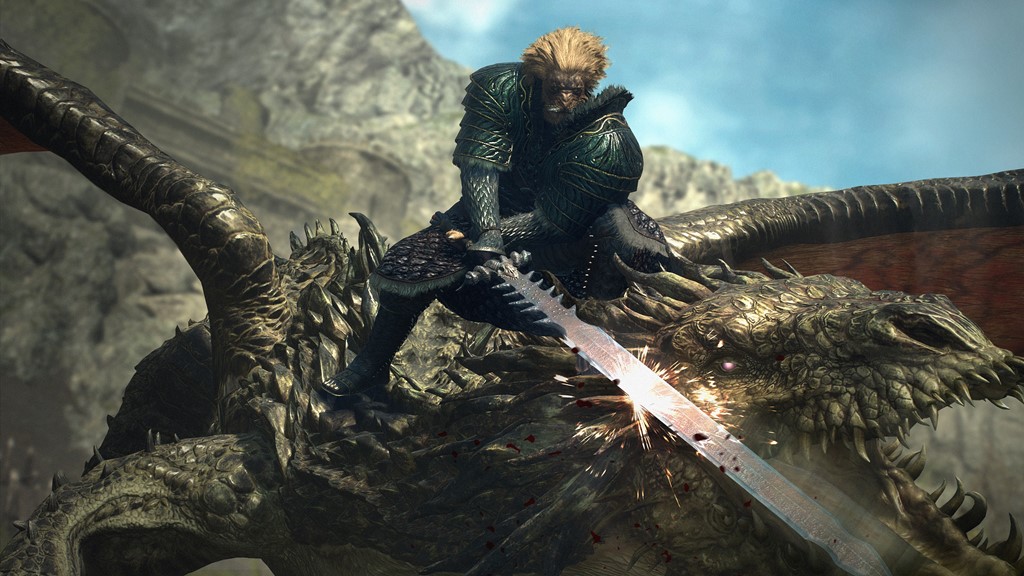
In many games, you’re never quite sure what’s going to happen next. Every level and point of plot progression introduces some new idea. The same is true of Dragon’s Dogma 2. The difference is that there will be many times in Dragon’s Dogma 2 when even the game’s developers probably couldn’t tell you what is about to happen.
Will that side path take you to a treasure or a troll’s lair? Will that giant flying monster remain satisfied attacking that pack of buffalo-like creatures or will it turn its sights on you? If you fall down a cliff and land on a ledge, will you be able to get back up? Will your companions ever actually do what you say? Will the game’s performance remain steady enough for you to finish a battle? The game is constantly posing such questions, and the answers to them can vary wildly with no explanation for those variances ever being provided.
Strangely, the same was often true of 2012’s Dragon’s Dogma: a game that quickly earned cult classic status for its inventive combat, deep character-building options, various technical problems, and often sub-par presentation. It’s something of a miracle that such a divisive game ever got a sequel, but logic tells us that such a sequel should accentuate the positives and address the negatives. If anything, we often root for obviously flawed (but undeniably interesting) games to get sequels because the solutions to those flaws seem equally obvious.
In some ways, that’s very much the case here. Dragon’s Dogma 2 is noticeably more refined than its predecessor. Enemy and companion AI is improved, character building is governed by fewer restrictions, various quality-of-life improvements have been added to quests and menus, and there are slightly more (and generally tighter) plot beats throughout. The Dragon’s Dogma 2 team was undeniably aware of the first game’s issues and efforts have been made to address those problems.
Yet, that makes it all the more remarkable that Dragon’s Dogma 2 is often just as messy as its predecessor in major ways. The controls feel deliberately inconvenient, presentation elements are still only a notch above many indie titles, glitches abound, enemy/companion AI often goes rogue, and even the simplest actions can lead to seemingly unintended consequences.
Worst of all are the technical issues. I played the game on PlayStation 5 where such issues rarely rose above annoyances, but early reports indicate that the PC version of Dragon’s Dogma 2 suffers from massive performance problems that will likely impact all but the most powerful PCs. Hopefully, those problems will be addressed soon.
So the verdict on Dragon’s Dogma 2 should be easy to give. If you liked Dragon’s Dogma, you’ll probably love its often objectively better sequel despite its problems. If you didn’t like that game, many of the same problems you probably had with it will likely impact your enjoyment of the sequel. It is a remarkable conclusion to reach given the time and resources that went into this sequel, but I’m sure many will reach it with ease all the same.
Yet, that’s not what I’m here to tell you. What I’m here to tell you is that a few hours with Dragon’s Dogma 2 may very well make you forget about all its problems simply because the game is so much fun.
“Fun” is a word I’d like to use more when talking about modern major video games than I often do. At a time when it feels like many Triple-A games are designed to be sold and invested in based on the strength of their often doctored promotional media, the experience of actually playing a game, and the enjoyment you get from that process, feels secondary to the business of looking good. Those games are too often then judged on the kinds of raw technical merits that we otherwise use to grade smartphones and microwaves. “Functional” and “aesthetically pleasing” are fine, but they don’t always translate to “fun.”
So much of the fun of Dragon’s Dogma 2 stems from another word that is hard to apply to modern major titles: “adventure.” Too many open-world titles take that idea for granted. They mistakenly believe that large worlds and plenty of things to do in them will automatically lead to a genuine feeling of adventure. The antithesis of such titles are games like Tears of the Kingdom and Elden Ring which know that real adventures come when you are never quite sure what will be around the next corner but always feel as if you are orgincally discovering it and, ultimately, need to find a way to overcome it.
Well, add Dragon’s Dogma 2 to the list of such titles. Like those games, Dragon’s Dogma 2 often utilizes a high degree of difficulty to instill the feeling that you may not be entirely prepared for what is about to happen. Dragon’s Dogma 2 allows you to wander into a bad part of town right away and offers no signposts that tell you not to go there. Even later on when you are significantly stronger, you will need to use every tool available to you just to survive (especially if you dare fight at night when the difficulty goes up). It’s an approach that ensures every looted item, every learned ability, and every crafted concoction actually matters because you will likely need to use all of them.
It’s not just the difficulty, though. Dragon’s Dogma 2 excels at making nearly every action feel like an extension of your character and party (in this game, your party is a band of recruitable mercenaries known as Pawns). You must always play to your chosen strengths (and, by extension, weaknesses) if you are going to survive. Mind you, that doesn’t mean adhering to a simple rotation of skills and advanced weaponry as is often the case in lesser games. Instead, you really have to come to understand your character as you constantly hone your skills against diverse enemies that often act erratically and are rarely felled by a single strategy. If you do not learn to adapt, you will not consistently overcome.
That unpredictability wonderfully extends to the rest of Dragon’s Dogma 2’s world. Simply wandering through that world will result in unforgettable occurrences. I’ve lured Cyclops to their doom across bridges that couldn’t support their weight, seen cave trolls wander into villages, and watched flaming beasts explode barrels that triggered landslides. Yet, I never once got the feeling the game strictly intended for any of that to happen when and how it did. Everything is the reward or consequence of what you’ve learned, what you did, and, more often than not, how you reacted to something you couldn’t have possibly predicted.
In Dragon’s Dogma 2, such experiences are more than mere moments. Every path, every treasure chest, every merchant, every Pawn, and, most importantly, every battle in this game was a genuine surprise. Dozens of hours into the campaign, I found myself equally amazed by the things I could do as the ways the game continued to test both my character’s powers, my own mastery of the mechanics, and my willingness to continue to be bold enough to try something new.
That’s the contradiction at the heart of Dragon’s Dogma 2. There are many aspects of this game that will turn people off right away and never give them a reason to look back. It is fundamentally janky (to say the least), its visuals are often bland and technologically outdated, its story is barely there, and little effort is made to ever put you on a power trip no matter how powerful your character becomes.
If you’re looking for high-end visuals, cinematic storytelling, and the kind of game you can turn your brain off and feel great in after a long day, I highly doubt Dragon’s Dogma 2 is for you. That’s to say nothing of those aforementioned performance issues will almost certainly outright ruin the game for some until they are resolved.
Yet, Dragon’s Dogma 2’s complete lack of fucks to give about any of that is often the source of its brilliance. Free of the desire to make something broadly appealing or even entirely accessible, the Dragon’s Dogma 2 team instead focused their considerable talents on making a game where chaos is a feature rather than a flaw. If you preach concepts like playing to your strengths and writing what you know, then you must look at a game like Dragon’s Dogma 2 and recognize it as both fundamentally the experience its creators desired to make and the kind of game no other studio could have nearly as well because of that.
Maybe there is an even better version of Dragon’s Dogma 2 still to come that has stunning visuals, smoother gameplay, fewer technical flaws, an expertly told cinematic story, and enough guardrails to ensure that nobody gets too lost along the way. However, after too many years of games that offer such pleasantries and little more, a messy masterpiece like Dragon’s Dogma 2 starts to feel like an essential experience as well as one of the absolute best games of 2024.
Dragon’s Dogma 2 is available on March 22 for Xbox Series X/S, PlayStation 5, and Windows PC.
The post Dragon’s Dogma 2 Turns A Cult Classic Into a Messy Masterpiece appeared first on Den of Geek.








